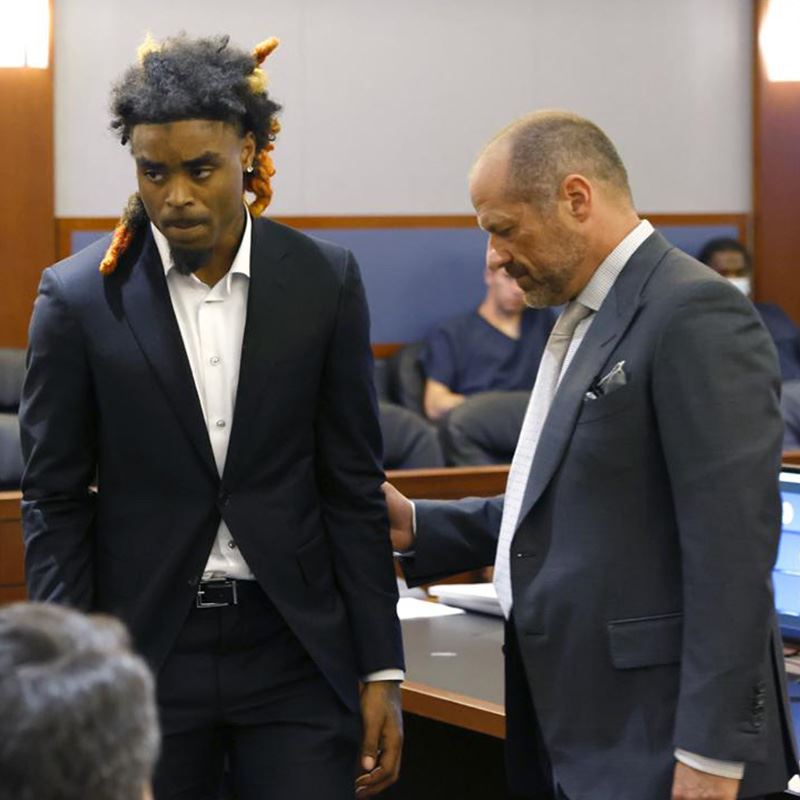
At Goodman Law Group, we provide relentless advocacy for your criminal defense needs. Our skilled attorneys are dedicated to fighting for your rights and achieving the best possible outcome, using a combination of extensive experience, strategic insight, and unwavering commitment.
Criminal Defense Firm in Las Vegas
Aggressive Defense Against Criminal Charges in Nevada
When facing criminal charges, having a knowledgeable and experienced criminal defense attorney by your side is crucial. At Goodman Law Group, we understand the complexities of the legal system and are committed to protecting your rights and ensuring a fair trial. Trust Goodman Law Group to provide the aggressive and effective representation you need when your freedom and future are on the line.
Mr. Goodman’s long years of experience have allowed our firm to provide services to various clients, from residents to visitors from around the U.S. and the world. In fighting diverse criminal charges in Nevada, we represent clients in minor infractions to multiple severe felony cases.
Almost nothing can disrupt and throw your life into a tailspin like a criminal allegation. The impact can be enormous, resulting in stress, disorientation, lack of knowledge, financial duress, reputational and career damage, and more.
From the moment you believe you are under investigation for a crime, you should seek the help of a trusted defense lawyer. Attorney Goodman can work closely with you to assess your situation accurately. In some instances, he may be able to prevent formal charges from ever being filed. In other cases, he may be able to persuade prosecutors to dismiss charges or reduce them in negotiated plea deals.
When you face charges, he can work to uncover all the circumstances surrounding your case and build the most credible and hard-to-assail defense possible. His methods aim to provide a suitable defense strategy that fits your unique situation using all the tools, knowledge, and skills at his disposal.
Call Goodman Law Group today at (702) 825-7854 or contact us online to learn more about our criminal defense services in Las Vegas!



Defending Your Future with Expertise and Determination
-
 Our Past Victories We're proud of the people we have helped and lives we've changed.
Our Past Victories We're proud of the people we have helped and lives we've changed. -
 Get Started Today The sooner you contact us, the sooner we can start your defense.
Get Started Today The sooner you contact us, the sooner we can start your defense. -
 What Our Clients Say Our clients share their stories and how we helped them.
What Our Clients Say Our clients share their stories and how we helped them.

Trusted Expertise, Unmatched Dedication
Choosing Goodman Law Group means partnering with a team that combines trusted expertise with unwavering dedication. Our deep knowledge of the legal system and commitment to your case ensure that you receive the highest level of representation and the best possible outcome.
-
Comprehensive Criminal DefenseWhether facing charges for DUI, violent crimes, or white-collar offenses, Goodman Law Group provides aggressive representation with a focus on achieving the best possible outcomes for clients in both state and federal courts.
-
Local Expertise, National ImpactAs a lifelong Las Vegas resident, Ross C. Goodman’s deep knowledge of local laws, courts, and legal professionals gives his clients a distinct advantage, while his nationally recognized legal skills elevate his reputation beyond the state.
-
Proven Track RecordWith nearly 30 years of experience and a history of high-profile victories, Ross C. Goodman is a top-tier criminal defense attorney, known for securing dismissals, "Not Guilty" verdicts, and favorable resolutions.
-
Personalized, Successful DefenseEvery case at Goodman Law Group is handled with meticulous attention to detail, ensuring personalized strategies that have resulted in reduced sentences, acquittals, and alternative legal resolutions for thousands of clients.

Why Choose Goodman Law Group for Your Criminal Defense?
When facing criminal charges, having a knowledgeable and experienced criminal defense attorney by your side is crucial. At Goodman Law Group, we understand the complexities of the legal system and are committed to protecting your rights and ensuring a fair trial.
Why choose our criminal defense services:
- Extensive experience: Our team of criminal defense attorneys has years of experience handling a wide range of criminal cases, from misdemeanors to severe felonies. We deeply understand the law and know how to build a strong defense strategy tailored to your specific situation.
- Personalized approach: We believe in treating every client as an individual with unique needs and circumstances. We take the time to listen to your side of the story, thoroughly investigate the facts, and develop a defense strategy that gives you the best chance of a favorable outcome.

.2506031435135.png)




.2308101413182.webp)




